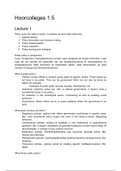Hoorcolleges 1.5
Lecture 1
Policy cycle: the steps in policy. In practice we don’t often follow this.
1. Agenda setting.
2. Policy formulation and decision making.
3. Policy implementation.
4. Policy evaluation.
5. Policy learning and changing.
Public policy in perspective
Case: immigranten (immigratiestroom) worden vaak neergezet als moslim terroristen, maar
vaak zijn het mensen die slachtoffer zijn van klimaatverandering en verwoestijning. De
immigratiestroom heeft misschien tot extremisten geleid, maar demoniseren we deze
mensen of stoppen we klimaatverandering?
What is public policy?
- Policies involve efforts to achieve public goals by specific means. These means do
not have to be public. They can be government effort, but can also be driven by
NGO’s for example.
- Examples of public goals: security, equality, development, etc.
- Intentional collective action (by, with or without government). It doesn’t need a
‘presidential stamp’ to be policy.
- An institution in the sociological sense: constraining as well as enabling social
behaviour.
- Governance: efforts where we try to solve problems where the government is an
actor.
What types of policy are there?
- Regulatory policies: policies that define government control/rules in specific areas.
Bijv. oude vervuilende auto’s mogen niet meer in het centrum komen. Regulating
behaviour.
- Constitutional policies: policies to establish a new institutional or organizational
operation. Bijv. Erdogan veranderde de grondwet waardoor hij meer macht kreeg. Of
decentralisatie. A change in basic political structure.
- Distributive policies: distributing/allocating new resources amongst actors. Bijv.
nieuwe olie-inkomsten.
- Redistributive policies: distributing/allocating existing resources amongst actors. Bijv.
belasting.
- Provisional policies: policies aimed at creating specific facilities/provisions. Bijv.
dijken.
What drives public policy?
, ● Inside-out perspective
○ Policies driven by internal dynamics, within the ‘policy cycle’.
○ Internal factors.
○ Path-dependency of established policies.
○ Once you have made a policy structure it has consequences.
● Outside-in perspective
○ Policies situated in societal context.
○ Outside dynamics/external factors.
○ Societal transformations put new demands on policy.
○ Failure to adapt leads to policy fiasco’s.
○ 4 key societal transformations: risk society, network society, liquid society,
hollow state.
Social transformations
● Risk society
○ Post-industrialisation, reflexivisation
○ Old risks: natural risks such as volcanic eruptions.
○ New risks: ‘manufactured risks’, risks of our own creating (rising sea levels:
we manufacture the risk with global warming etc. We are facing this risk we
created ourselves.) Other example: financial crisis, fukushima meltdown
incident.
○ Risks don’t stop at borders: ‘world risk society’. For example climate change,
financial crisis, terrorism.
○ Complexity of modern society leads to uncertainty and demands: ‘reflexivity’.
- Public policy: subpolitics at the level of policy subsystems to promote
reflexivity.
● Network society
○ Role of technology (ICT, transport). The globalizing effect of technology had
effect on policy (as opposed to risk society, where it’s the technology itself).
○ Globalization of economic, social and cultural life. This process will continue
to increase.
○ Growing connectedness leads to growing interdependencies and complexity.
A crisis for example will spread to other countries almost immediately.
Working together is a must.
○ New divisions between winners and losers. Global winners and losers are not
all in exact opposite places. Even in just Rotterdam you can see both winners
and losers. It’s too simple to say Europe is a global winner, the rest is a loser.
It’s far more complicated.
- Shifting politics: can policies respond to the network society? For example,
the bitcoin leading to global interconnections collapses. What control does a
government have?
● Liquid society
○ Individualisation: freedom from traditions and authority. The modern citizen is
not afraid to give their opinion. The government has to deal with these.
People no longer just accept policy the government implements.
1
, ○ De-institutionalization: institutions like family, church etc. become less and
less dominant.
○ Freedom vs. uncertainty: freedom to make your own opinions, uncertainty can
you have opinions on for example bitcoin if you don’t understand bitcoin?
○ Paradox: individualisation and cultural hypes (mass society). We all like to be
individuals, but are hiding behind popular hypes, which can impact policies.
For example, people following the hype of populism.
- Public policy: the drifting voter and the growing role of the media.
- Does the liquid society lead to a ‘drama democracy’?
● Hollow state
○ States are losing control.
○ Loss of belief in ‘rational societal steering’ by the state.
○ Shift from government to governance.
- Public policy: shifting policies ‘upwards (like EU), outwards (like private sector
companies, such as border control) and downwards (such as municipalities)’
away from the state.
- New forms of policy processes: interactive governance, coproduction, policy
innovation.
Perspectives on public policy
● Rationalism
○ Knowledge and information (to make a rational, informed decision).
○ Problems can be measured: ‘lies, damned lies and statistics’.
○ ‘Politics spoils good policies’: depoliticization. Policies are not to be left to
politicians.
- Building Trump’s wall as a rational solution to the immigration problem. A
cost/benefit analysis of the immigration problem. Trump says the most
effective solution is the wall.
● Political perspective
○ Key role of power and conflict. Everything is subject to conflict/ power
struggles.
○ Symbolic and economic resources. Who has the most (economic and
symbolic) power. Trump wants to portray himself as a strong, charismatic
leader.
○ Policymaking as an essentially political process: politics is everywhere.
- Building the wall as a sign of political strength, for example arguing about who
is cooking dinner is politics.
● Culturalism
○ Policymaking as ‘social construction’.
○ Key role of stories, frames, narratives, image symbols.
○ Mediatisation. The media is important in forming public opinions and
perceptions.
○ Rhetorics.
- Building the wall to construct a narrative of being firm on immigration. Trying
to influence perceptions of him.
● Institutionalism
2





